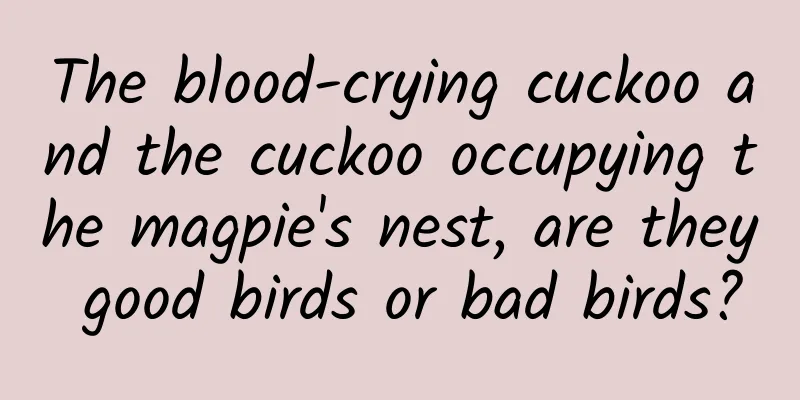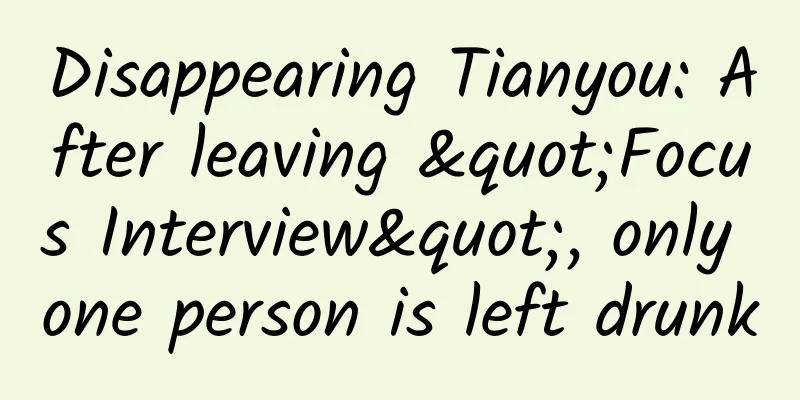The blood-crying cuckoo and the cuckoo occupying the magpie's nest, are they good birds or bad birds?

|
There is a beautiful legend about the cuckoo. It is said that in ancient times there was a king named Wangdi who loved his people like his own children. Every spring sowing season, he would run around urging people to sow quickly. In the end, he died of overwork. After his death, Wangdi turned into a bird. The bird did not forget the suffering of the common people. Every spring, it would chirp "cuckoo~cuckoo~" to remind everyone that only by sowing in time would they have a good harvest. This bird sings day and night until it bleeds profusely, and its blood drips into the ground. Then clusters of gorgeous flowers grow in the soil. People call this flower azalea and this bird cuckoo. In reality, the cuckoo bird has a nice name, is not ugly, and has a beautiful voice, so many girls are named Dujuan. In fact, many people don’t know that the cuckoo bird has a bad reputation, which is that it occupies the magpie’s nest, and its behavior is very despicable. Of course, parents who give their girls this name do not want their daughters to become the third party who takes over the nest of a man, but people are different. Although some people are not named Dujuan, they have been infected with this bad habit. However, it is very rare to find a bird as "evil" as the cuckoo. So whose cake is being taken away by the cuckoo? In fact, we cannot wrongly accuse all cuckoos. Among all cuckoos, only one-third of them have the habit of occupying the magpie's nest, and the remaining two-thirds are relatively law-abiding. There are three types of cuckoos: the big cuckoo, the three-note cuckoo, and the four-note cuckoo. The big cuckoo is also called the cuckoo because its call sounds like "cuckoo, cuckoo"; the three-note cuckoo's call sounds like "Mi Guiyang", so it is also called the Mi Guiyang bird; the four-note cuckoo is also called the Zigui bird, and its call sounds like "Quickly harvest the wheat" or "Quickly harvest the grain". Therefore, the species of cuckoos are mainly distinguished by their calls. Of course, there are also differences in their appearance, but I will not go into details here. There are more than 80 species of nest parasitic birds, which is a special breeding behavior in which birds lay their eggs in the nests of other birds and have the nest owners hatch them on their behalf. People call these unlucky birds that hatch the eggs "adoptive parents", which is a bit like human foster mothers and wet nurses. However, although the "adoptive parents" of birds help the parasitic birds to raise their offspring, they are very different from human adoptive mothers and wet nurses. Because human adoptive mothers or wet nurses will be respected and rewarded for raising other people's children, while these unfortunate birds who are parasitized are completely unaware and fooled, and they have to sacrifice their own offspring. Therefore, in essence, the "adopted relatives" are not only not "relatives", but also have a deep blood feud. There are 125 host bird species harmed by cuckoos, including reed warblers, magpies, shrikes, euphoniums, flycatchers, wagtails, etc. For example, cuckoos like to choose great reed warblers, four-note cuckoos like to choose gray magpies, noisy cuckoos like to choose spotted starlings, eight-note cuckoos like to choose leaf-tailor warblers, etc. Of course, who will become the unlucky one depends on whether it is convenient for the cuckoo to parasitize the nest, so it is full of uncertainty. How "evil" is it that the cuckoo takes over the magpie's nest? The cuckoo is relatively large, and usually picks on birds that are smaller than itself, which is a perfect interpretation of the animal's nature of bullying the good and fearing the evil. The measures it takes generally include intimidation, driving away, and ambushing. For example, sometimes the cuckoo will expose its chest feathers and imitate the appearance of an eagle, scaring the petite reed warbler into hiding, and the cuckoo will quickly lay an egg in its nest. Although the cuckoo is big, the eggs it lays are not that big, and the patterns and colors are similar, so it is difficult for the reed warbler to distinguish. The great cuckoo usually only lays one of its own eggs in a nest, and will also take away the host's eggs, which makes it even more confusing. When the frightened reed warbler finally returns to its nest, it will check that there are no missing eggs, and will foolishly continue to incubate them. Sometimes, when the great cuckoo finds that some unlucky bird is building a nest and hatching, it will hide in a high place where it can see the host bird's nest and wait for the opportunity. When the host flies away to find food, it will take advantage of the opportunity to lay its own eggs. Sometimes the nest it finds is very small, such as the nest of the leaf warbler, which is very small and cannot support the huge body of the cuckoo bird. The great cuckoo will first lay eggs in a hidden place, and when the host leaves, it will carry the eggs into the nest, and then take one of the eggs in the host bird's nest and discard it. The cuckoo's eggs begin to gestate in the bird's belly before they are born, so they usually hatch faster than the host's eggs. When the cuckoo chicks hatch, they immediately show their bloodthirsty nature. They will push their newborn companions or unhatched eggs out of the nest and smash them to death. Even if their "foster mother" sees it, she is so stupid that she can't do anything about it, and she feeds this "only son" more and more affectionately. The little cuckoo is growing very fast and looks less and less like its mother and father, but unfortunately birds have no ability to distinguish, let alone paternity testing technology, so they will do their best to feed it. Every day they take risks and work tirelessly to bring back the little insects they find and feed them into the mouth of this little rascal. As the cuckoo baby grew up, a strange phenomenon occurred. The baby soon surpassed its mother and the nest could no longer accommodate it. The reed warbler and other "adoptive mothers" were not surprised to see this giant baby and tried hard to find food to satisfy its growing appetite. It is very likely that until they parted ways, the reed warbler did not realize that it had sacrificed its children and raised an enemy. Seeing the skinny "foster mother" trying her best to put her little head with the insect in her mouth into the little cuckoo's blood-red mouth, I felt really sorry for the reed warbler and became indignant towards this "little devil". So I'd like to make an off-topic assumption: No matter how hard the mother reed warbler hunts, she can't satisfy the growing appetite of this "giant baby". She is very puzzled. One day, she meets her long-lost friend, the field pipit, and expresses her doubts. The yellow reed bittern sighed and said: You and I have been fooled, they killed all our offspring, we have a blood feud. The reed warbler finally realized what had happened, but it was too late. The little cuckoo had already flown away. The reed warbler could only cry in anger and grief to the sky in the reed marsh. Finally, it stopped crying and decided to take revenge. It found the mother of the little cuckoo and cried miserably. It fought the huge cuckoo with its weak body and was no longer afraid. There is no ending as to who will win or lose in the end, so you guys can figure it out. Why doesn't the great cuckoo hatch its own eggs? In fact, the animal world is not like humans, with so many moral codes and legal provisions. They follow the law of the jungle, survival of the fittest, and balanced evolution. The reason why the Great Cuckoo does not build a nest to hatch its offspring is determined by its living habits. First of all, unlike some birds, the Great Cuckoo is monogamous. The husband will help with nest building and egg laying, and they will share the responsibility. The Great Cuckoo is polygamous, and the husband is a typical selfish scum who will not share any responsibility with his wife. The female bird only lays 2 to 10 eggs a year, and the interval between each egg is long. If she incubates the chicks by herself, another egg may have just been laid and she has to incubate it. This way, there is really no time to adjust the time between laying eggs and incubating them. As a result of long-term evolution, it is natural for the female bird to pass the burden of incubation to other unlucky eggs. In fact, it is not as easy as imagined for a cuckoo to let other birds hatch its eggs. It needs to think of many ways and work hard. Sometimes it needs to intimidate, sometimes it needs to hide in the dark and spy, and it needs to find the right opportunity like a thief. In order to make its eggs pass through the hatch, the genes in its body also need to help, so that its eggs are similar to the host eggs in terms of pattern, color and color. Even so, sometimes the host will see through it and peck the disguised eggs, and all the previous efforts will be wasted. The burden of childbirth can only be borne by the female bird alone, all because of the bad bird husband who does not take any responsibility. It is really pitiful. The hatched cuckoo chicks are just "bad by nature" and have never thought of harming their companions. They are not that smart. There is a natural depression on the back of the newly hatched cuckoo chicks, and there is a sensitive spot inside. Once touched by another chick or egg, they will arch outwards as a conditioned reflex. This is the instinct that their ancestors gradually evolved through countless life and death lessons to protect themselves and eliminate the enemy. In addition to this killing instinct, cuckoo chicks also have a begging instinct, which is to shake their wings violently, open their blood-red mouths, and sing loudly, like the wailing of a heartbroken and liver-hurting child. Seeing this, the "foster mother" will be deeply stimulated and will desperately keep hunting for food to feed them. Why is the cuckoo also known as a beneficial bird? Bird experts list the cuckoo as a famous beneficial bird because it feeds on forest insects, especially pine caterpillars and poisonous moths that other birds dare not eat. Its diet also includes locusts, walking beetles, click beetles, bees and many other insects, which protects the forest ecology. The number of birds they parasitize is not large, and these birds are generally dominant species in the local area, much larger than cuckoos, so this parasitic method does not damage the ecological balance. Some experts believe that parasitic birds such as cuckoos are beneficial to the ecological balance in the parasitic and anti-parasitic competition with the parasitic host birds, and continuously promote and accelerate the evolution of species. Of course, humans themselves are also a species in biological evolution, and they also follow the competition rules of survival of the fittest. Whether they are beneficial birds or not depends entirely on the overall ecological balance and whether they are beneficial to humans. As for those bullied groups such as reed warblers parasitized by cuckoos, we can't care so much. After seeing these actions of cuckoos, do you still have a good impression of them? Would you still name your daughter Dujuan? Welcome to discuss, thank you for reading. The copyright of Space-Time Communication is original. Infringement and plagiarism are unethical behavior. Please understand and cooperate. |
<<: Hot search! Running faster than athletes? This is indispensable for exciting game broadcasts
>>: Olympia and Olympus, an immortal legend, why did it become Olympics?
Recommend
How to sell tens of millions of wine through short videos?
Short video sales have become a common sales meth...
Creative hand-drawing丨Look! Someone has drawn the wonderful extravehicular content you missed last night!
At 00:55 on December 27, 2021, Beijing time, afte...
How did the last population of mammoths disappear from the earth?
As a species that "just" became extinct...
From 0 to 1 users, how to do a good job in seed-stage user growth operations?
The product operation cycle is generally divided ...
Why do we need to analyze user behavior?
1. What is user behavior ? User behavior is compo...
Top 1000 Mobile Apps in October 2016
I believe that every time there is a more intuiti...
Promotional Marketing: A brief discussion on vlog’s brand marketing and traffic monetization!
With the vigorous development of the Internet sho...
Rare crab reappears in the wild
More than a century later, a rare crab species ha...
The world is watching! What exactly is the "Starship" that Musk is going to launch today?
After four years of various tests, ignitions, and...
World Health Organization: There will be about 20 million new cancer cases worldwide in 2022, including 2.5 million new lung cancer cases
The International Agency for Research on Cancer u...
For event operation and promotion, how to use H5 to create a hot-selling product?
H5 has become a common form of content for event ...
4 “Golden Rules” to Increase Revenue from Incentive Video Ads
The "dark horse" of motivational videos...
What nutrients does umbilical cord blood contain?
When it comes to the source of nutrition for babi...
Automobile maintenance information collection of high-quality resources Baidu network disk download
Automobile maintenance information collection of ...
Change or die? Will the smart ecosystem platform become the next hot topic?
[[125438]] 2014 was a critical year for domestic ...









